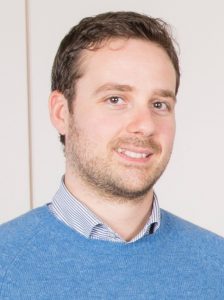Agostino Romeo |
|
|
Dr. Agostino Romeo received his Master degree and PhD in Materials Science in 2010 and 2014, respectively, both from the Università degli Studi di Parma (Parma, Italy). During his PhD he worked at the Institute of Materials for Electronics and Magnetism (IMEM, Parma, Italy) under the supervision of Dr. Salvatore Iannotta, on the development of organic electrochemical transistors for biosensing applications. He continued his research as a Postdoctoral Researcher at IMEM for two years, then he joined IBEC in early 2016 as a Postdoctoral Researcher at the Smart Nano-Bio-Devices group, led by Prof. Dr. Samuel Sánchez. In late 2016 Dr. Romeo obtained a fellowship within the BEST Postdoctoral Programme with a project on smart contact lenses for personalized health assessment. His current research is focused on the application of electrochemical sensors for wearable point-of-care medicine, employing flexible and stretchable materials. |
 |
Group: Smart Nano-Bio-DevicesSupervisor: Samuel Sánchez |
|
Project: Contact lens sensors for advanced point-of-care diagnostics (SPOC)Contact lenses are the ultimate wearable technology since smart devices in direct contact with our eye promise astonishing applications in terms of augmented reality, enhanced vision, medical sensing and much more. In particular, smart devices in direct contact with our eye hold unprecedented potential for personalized medicine as miniaturized biosensors integrated with Smart Contact Lenses (SCL) permit non-invasive and continuous monitoring of biomarkers contained in tear fluid. Dr. Romeo’s BEST project sets within the fields of wearable electronics and personalized medicine and is based on the development of a Smart Contact Lens (SCL) for non-invasive, painless and on-demand self-assessment of health. The technology proposed here is based on biosensors integrated in contact lenses that accurately and non-invasively monitor the levels of biomarkers such as glucose, cytokines, lactate, and ionic species, among others, contained in tear fluid. On-demand SCLs are envisaged here due to the versatility of the sensing platform that can adapt to user’s specific needs in terms of target biomarkers and health issues to monitor. Non-invasive wearable technologies allow to monitor the health status of an individual as often as needed and in any location, thus with limited to neglectable interference with daily life activities. Therefore, the technology presented here will decisively contribute both to early diagnosis and accurate therapeutic efficacy. |
|
